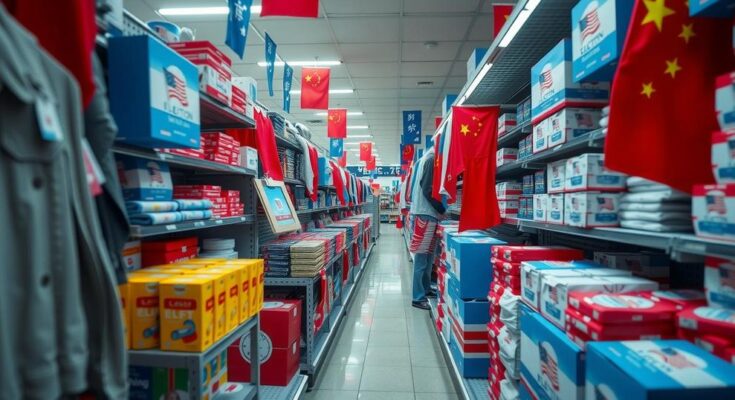The influx of cost-effective election merchandise from China is challenging American manufacturers as voters support their candidates with items that may not be domestically produced. E-commerce platforms are facilitating this trend, exemplifying a significant price disparity between U.S.-made and Chinese-made campaign items. This raises concerns regarding trade practices and the effectiveness of policies aimed at bolstering domestic manufacturing.
As the United States presidential elections approach their culmination, there has been a marked increase in voters showcasing their allegiance to their preferred candidates through various election-themed merchandise. However, a significant proportion of this merchandise, including iconic items such as the “Make America Great Again” hats and novelty T-shirts supporting various candidates, may be sourced from Chinese manufacturers. The proliferation of such products has been accelerated by e-commerce platforms, which have facilitated the influx of cost-effective election items from China, putting American manufacturers at a distinct disadvantage. Ben Waxman, co-founder of American Roots, an apparel company dedicated to U.S. manufacturing, stated, “I think the amount of stuff on Amazon and Etsy that’s coming from China and other countries in cargo ships and unloaded on American shores is drastically impacting American manufacturers’… ability to compete and grow our own business. I think it’s dramatic.” Despite Waxman’s reluctance to disclose specific figures regarding production or profits, he pointed out a stark price disparity; U.S.-made campaign T-shirts are priced around $15, while equivalent items from Chinese retailers such as Temu can be as low as $3. The overwhelming presence of Chinese goods on platforms like Amazon and eBay is evident, as significant numbers of election-related items are available at fractions of the cost of official campaign merchandise. For example, Temu’s offerings include a “Make America Great Again” hat for under $4, contrasting sharply with prices of $40 on the official Trump campaign website. Similarly, Kamala Harris-themed hats retail for approximately $3 on Temu compared to $47 on her campaign’s official site. This pricing trend underscores the challenges the United States faces in attempting to diminish its reliance on Chinese imports. The trade regulation known as the de minimis loophole, which allows for the duty-free importation of goods valued under $800, exacerbates these challenges. Kim Glas, of the National Council of Textile Organizations, noted the detrimental impact of this loophole, stating, “[We] lost 21 manufacturing operations over the last 18 months.” Moreover, Glas mentioned a noted decrease in campaign merchandise sales compared to prior election cycles. Efforts to understand the extent of imported campaign merchandise were met with silence from major e-commerce platforms like Amazon and eBay. Temu has maintained that its growth is not predicated upon this loophole but is instead attributable to its operational efficiencies. The inconsistency between candidates’ rhetoric on supporting American manufacturing and the purchasing behaviors of their supporters raises critical concerns. Mitch Cahn, president of Unionwear, remarked, “If someone is supporting a candidate because of that candidate’s economic policy… by buying a product that’s made in a country that stands for the opposite of that, they’re actually doing themselves… a disservice.” The open nature of campaign merchandise production additionally contributes to the prevalence of Chinese-made products, as competition in this space does not favor domestic manufacturers. The Associated Press has reported on the prevalence of products, including items such as Donald Trump’s “God Bless America” Bibles, being printed in China, suggesting a broader trend that contradicts the narrative of promoting American-made goods. Critics like political consultant Marc Zdanow speculate whether revelations regarding the origins of campaign merchandise will influence undecided voters. Chris Tang, a professor specializing in business management, offered insight into this issue, noting that while job losses in manufacturing are concerning, they also present new opportunities for small businesses to exploit inexpensive imports for rapid sales. He emphasized the importance of the U.S. focusing on high-value manufacturing rather than low-cost election merchandise.
The topic revolves around the growing prevalence of election merchandise manufactured in China, particularly as the U.S. presidential election nears. Despite candidates’ campaigns often advocating for American-made products, many supporters are unknowingly purchasing items produced overseas due to lower costs. This situation reflects a wider debate about the impacts of cheap imports on domestic manufacturing and the effectiveness of trade policies governing such practices.
The surge of Chinese-made election merchandise in the U.S. has amplified the challenges faced by American manufacturers as they contend with significant price discrepancies and the influence of e-commerce platforms. The continuation of the de minimis loophole exacerbates these challenges, allowing for the unencumbered importation of goods that ultimately undermine local businesses. The disconnect between political rhetoric and consumer behavior highlights a critical irony in the quest for revitalizing American manufacturing.
Original Source: www.voanews.com




